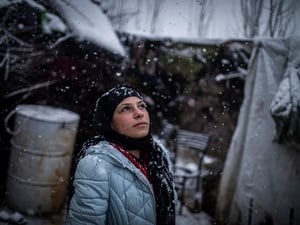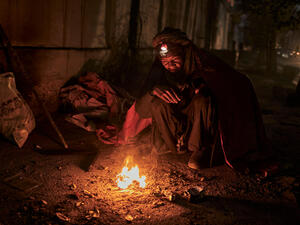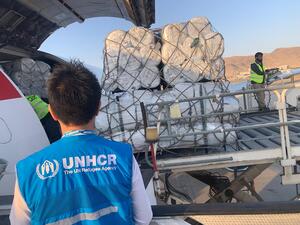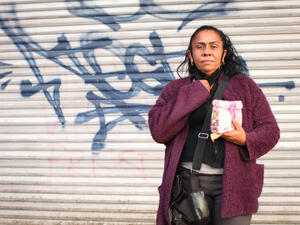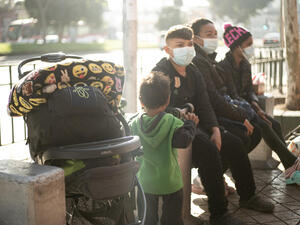Afghans face bleak second winter on Pakistan border
Afghans face bleak second winter on Pakistan border
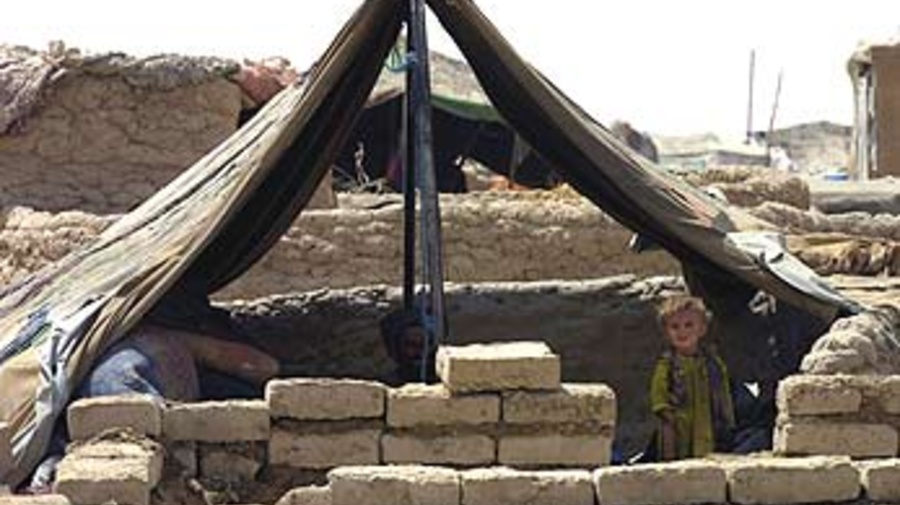
Afghans at Chaman's "waiting area" face a harsh winter with limited assistance.
CHAMAN, Pakistan, December 9 (UNHCR) - A frigid wind howls through the makeshift tents housing 19,000 people - all Afghans - jammed since nearly a year ago into a wasteland encampment just inside the Pakistani border and who are now facing their second sub-zero winter at the site, their future still unresolved.
With temperatures of at least -10°C at night, UNHCR on Sunday, December 8, began an emergency distribution of clothing and nearly 20,000 extra blankets in Chaman, with additional distributions in nearby official refugee camps. Although reports of sudden deaths from the cold proved unfounded, the urgency was underlined by indications that 11 children had died in the squatters' camp over the previous six weeks from various causes.
However, the ambiguous status of the area - not an official refugee camp but an increasingly permanent settlement of mud houses built illegally on land that the government of Pakistan wants cleared - has limited UNHCR's ability to provide help. Aid organisations cannot provide any assistance that might encourage a long-term stay.
The government allowed UNHCR to give the residents, left stranded in what is labelled the "waiting area" when Pakistan refused to admit more refugees after February this year, a few tents for the most vulnerable families in July. It took that long as well to supply food and enough drinking water to the barren strip of land.
While the refugee agency can provide blankets, it is not supposed to distribute stoves to heat the tents. Non-governmental organisation Médecins Sans Frontières runs a Basic Health Unit for the "waiting area" but does not want to handle cases of tuberculosis unless assured that patients will remain for a year to complete their treatment. Stopping in mid-treatment could just make the disease resistant to the medicine.
Last week elders, wrapped in blankets against the cold, assembled in a tent to present a request for education for their children - a service UNHCR provides to the refugees who had arrived just before those now in the "waiting area" and were placed in official refugee camps near the border.
"A month or two after we arrived here, we requested a school for our kids," said Abdul Qayum, a father of one son and two daughters who had lived in Afghanistan's Ghazni province. "But the request was never accepted and our children are still going without education."
Intriguingly, the demand for education is coming from people who are mainly Kuchis, the Pashto-speaking nomads whose herds have been devastated by years of drought in Afghanistan. Virtually all are illiterate.
"We are Kuchis and the concept of school is new to us. We kept on moving from one place to another so we had not time for this education," said Abdul. "But now that we have settled, we have realised that the reason we are in a situation like this is that we ourselves have no education.
"If we had education we would not be depending on handouts," said the community elder. "It will be a far better life for our children with education. They can participate in government, they can contribute to other sectors as well - not sitting idle like they do here."
But the situation is unlikely to change soon for the thousands of Afghans living under tents that are often little more than plastic sheets or rags sewn together. The refugees continue to request a transfer to the camps that were set up to house the thousands of Afghans who fled the United States-led war against the Taliban a year ago.
But Pakistan, citing a new government and improved security in Afghanistan, does not want to accept more refugees and potentially trigger a fresh exodus. It sees a settlement right on a border rife with smuggling as a security threat, and wants the Afghans to return home.
Pakistan only reluctantly agreed to UNHCR providing some aid at Chaman, and the resident's replacement of the rag tents with mud houses triggered alarm. Pakistani officials had originally considered demolishing the mud houses to emphasise opposition to a permanent settlement. But they now say they will allow those already built to remain this winter - but not to allow any further construction.
"In principle these mud houses should be demolished, but this was not done on humanitarian considerations," Mumtaz Ali Raja, commissioner of Balochistan province's refugee department, said to refugee elders during a recent meeting.
For the moment, this unpalatable status quo is holding. The refugees will stay as winter bites, and UNHCR will continue to provide limited assistance. It is not a long-term situation.
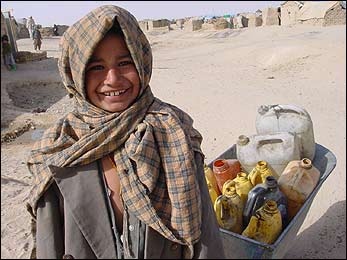
A young Afghan with a wheelbarrow of used oil that those at Chaman are burning to keep warm in sub-zero temperatures.
Mumtaz told the refugee elders: "The food assistance that the asylum seekers are receiving now, it is not clear how long it will continue. If it stops tomorrow then you will be in trouble. So before that happens a solution needs to be found."
In August, UNHCR offered to move the residents temporarily to Zhare Dasht, a new community built outside the southern Afghan city of Kandahar, where full assistance is available. More than 7,000 of those in the "waiting area" took up the offer, but as acceptances dwindled the available space was offered to internally displaced Afghans.
Many residents of the "waiting area" say they want to go directly home, rather than relocating temporarily to Zhare Dasht. But the Afghans, 60 percent of whom are from northern Afghanistan, say there is still too much fighting and lawlessness in their regions to risk a return.
The only advantage of the "waiting area" over Zhare Dasht is the proximity to urban areas where displaced Afghans can find day work. But for many that has been enough to offset the Zhare Dasht offer of tents, water, food, heating and education to everyone.
They hold on, hoping for a move to an official refugee camp. But, disregarding the prospect that Pakistan may ultimately enforce its demand that they return to their own country, they are also resigned to a long stay on the border.
"Till there is peace in our country we are staying here," said Aziz Khan, an elder from northern Afghanistan. "Let it be one year or a hundred."
By Jack Redden and Babar Baloch
UNHCR Pakistan


